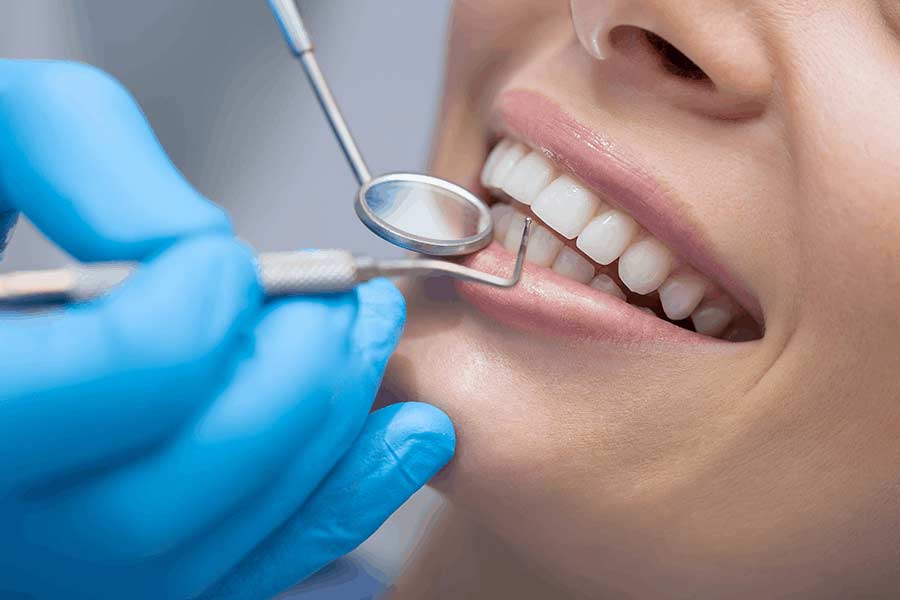When you think of being healthy, what comes to mind? Is it maintaining a certain number on the scale, a healthy heart or having perfect, six-pack abs? Maybe it’s all of the above. Good health may mean different things to different people. One thing most of us can agree on is we want to feel and look our best.
To stay healthy, you might eat right, do Zumba or slather on sunscreen when you hit the beach. All of the above are good habits to stay healthy. But how often do you consider your oral health as part of living a fit, healthy lifestyle? You might be surprised to find out your oral health plays an important role in your overall wellbeing.
Conditions Linked to Poor Oral Health
There is a saying that “the eyes are a window into the soul.” That may be true, but your mouth is a window to the rest of your body. Your dental health can offer clues regarding your overall health.
According to the American Dental Association, studies have indicated that poor oral health is connected to certain medical conditions. For instance, gum disease may increase the risk of heart disease. The theory is bacteria that causes gum disease may contribute to inflammation in other parts of the body including the arteries.
But, that’s not all. Researchers are discovering there is a relationship between diabetes and gum disease. According to an article in Clinical Diabetes, published by The American Diabetes Association, people with diabetes have a higher rate of developing periodontal disease than nondiabetics. Chronically high blood sugar levels may increase inflammation that leads to gum disease. In turn, inflammation from gum disease may make it harder to control blood sugar levels.
Another potential consequence of gum disease is premature birth. If you are pregnant or planning on becoming pregnant, you want to keep your bun in the oven until it’s healthy for your baby to be born. But some studies have indicated that gum disease may increase your chances of having a premature birth. According to the University of Maryland Medical Center, bacteria that causes gum disease may lead to an immune system reaction that triggers dilation and contractions in some women.
What is Gum Disease?
One of the biggest indicators of your oral health is whether or not you have gum disease. Gum disease, which is also called periodontal disease, involves an inflammation of the gums and surrounding tissue. Inflammation of the gums might not sound like a big deal, but it can cause more problems than you might realize.
In most cases, gum disease develops in stages. If you first notice a little bleeding when you floss, you might be in the early stages of gum disease, which is called gingivitis. If left untreated, it usually gets worse and progresses to periodontitis.
Periodontitis is definitely bad news, but what gives? How does it develop? Gum disease develops in a couple of ways. The food you eat can get trapped between the gum and tooth or even under the gum edges and lead to an infection. Also, plaque constantly forms on your teeth. Brushing removes a lot of the plaque if you do it correctly. But plaque left behind can harden and turn into tartar, which can lead to periodontitis.
Although anyone can develop gum disease, you’re at a higher risk if your teeth are crooked and hard to clean. Your chances of developing gum disease also go up if you’re pregnant, a diabetic or a smoker.
Symptoms of Poor Oral Health
The thing about poor oral health is you might not realize you have it until it’s already causing tooth loss. But there are several warning signs that may mean your oral health in on the decline. For instance, one of the early signs of periodontal disease is bleeding and tender gums when you floss or brush your teeth.
Some people also develop bad breath. Not typical bad breath that everyone gets once in awhile. Instead, gum disease can cause chronic bad breath. Additional symptoms of periodontal disease include loose teeth, a change in your bite and receding gums.
Protecting Your Oral Health
You probably understand the importance of good dental health. After all, gum disease is more than just a bummer. It can have serious health consequences, which is a pretty strong reason to protect your oral health.
Remember, poor dental hygiene can have a domino effect. It can lead to a buildup of plaque, which turns into tartar and before you know it, you have gum disease. Gum disease often becomes worse if left untreated. Then you’re looking at a variety of possible problems.
So, what can you do? You brush your teeth every day and see your dentist from time to time. Is that enough to maintain good oral health? Well, it’s a good start, but it’s important to be a little more diligent about keeping your mouth healthy.
Maintaining good oral health should include brushing your teeth twice a day with a fluoride toothpaste and flossing daily. Use a soft bristle toothbrush and consider replacing your toothbrush every four or five months. Limit the bad stuff that could be harmful to your teeth, such as soda, sugary treats and smoking.
It’s also essential to be proactive when it comes to seeing your dentist. Don’t wait until you’re dealing with a toothache to schedule a visit. See your dentist for a checkup every six months. Also, follow your dentist’s recommendations regarding how often you should have your teeth cleaned. Visiting the dentist regularly allows problems to be identified early when they are often easier to treat.


